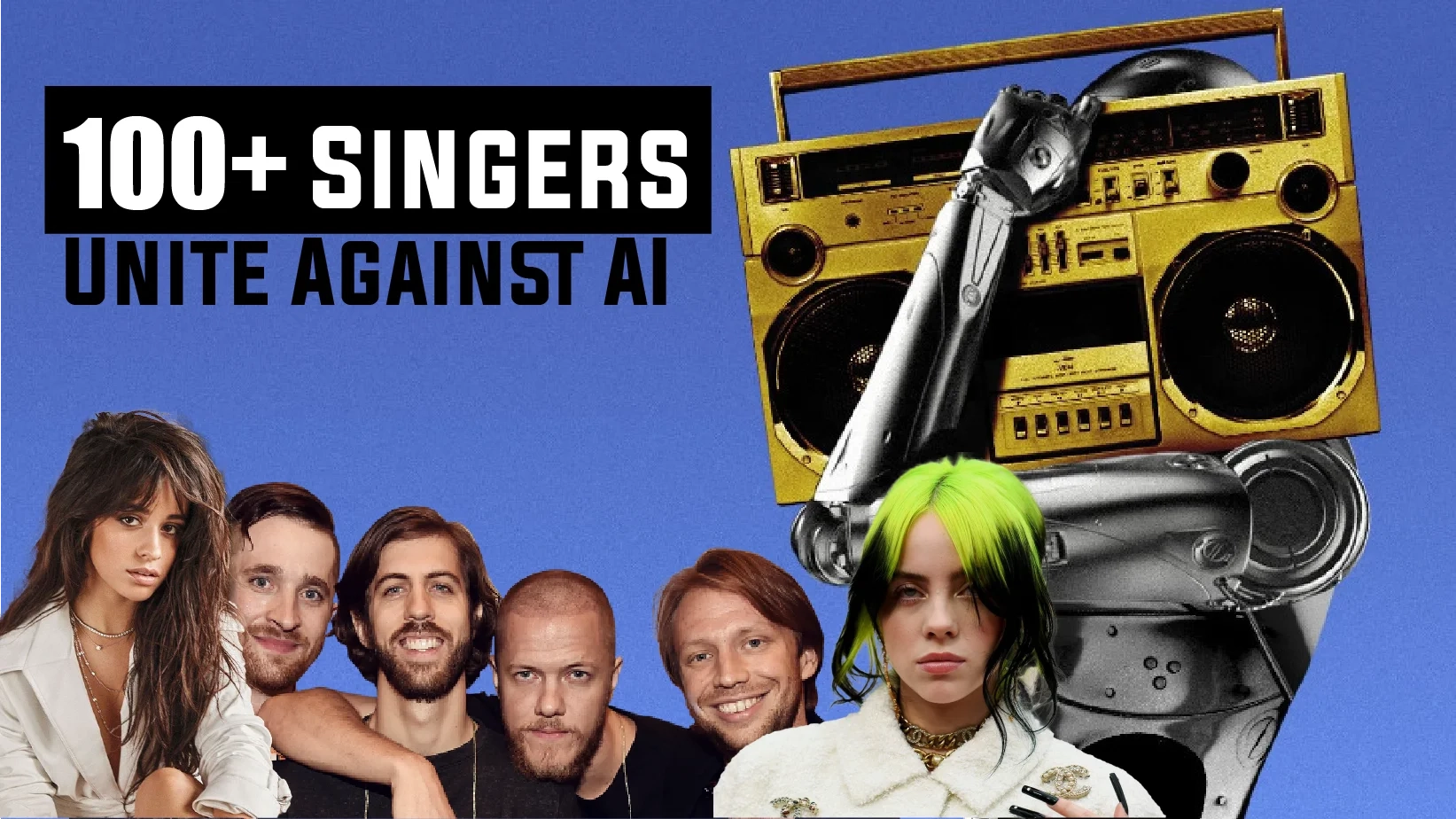100+ Singers Unite Against AI, Demand Respect for Artists’ Creations

Have you heard about the latest showdown in the music scene? It features big-name artists like Billie Eilish, Nicki Minaj, Stevie Wonder, and dozens more teaming up to take on AI developers. What’s got them all riled up? Well, as part of singers uniting against AI, these artificial intelligence whizzes have been messing with their tunes without asking permission first.
Key Insight:
- The letter, first highlighted by Variety, calls out AI developers, tech giants, and digital music platforms for infringing on artists’ rights by letting AI control creativity.
- Artists are upset that AI is learning from their music to create its own, fearing it will devalue their work and impact their earnings. About 60% of musicians use AI to make their music, and that’s why renowned singers unite against AI.
- They demand AI developers stop creating tech that mimics human creativity to protect artists’ rights and the integrity of their craft.
Artists’ Perspective:
Now, imagine putting your heart and soul into creating music, only to have some algorithms swipe it without a second thought. That’s exactly what’s got these artists seeing red.
Amid it all, Billie Eilish, renowned for her haunting melodies, echoed the sentiment, emphasizing how artists pour their hearts into their music. For her, seeing it treated merely as another data point by AI is deeply unsettling. However, 60% of musicians already utilize AI to create music.
Singers Unite Against AI with A Call for Respect:
So, they did what any group of passionate artists would do. All singers united against AI and penned a letter, calling out the big shots for their shady tactics. They’re demanding respect and recognition for their hard work, and rightly so.
Content of the Letter:

This letter, first published by Variety, accused AI developers, tech companies, and digital music platforms of working to “infringe upon and devalue the rights of human artists” by using AI to replace the work of songwriters and musicians.
And it’s not just about artistic integrity. It’s about the bottom line, too. Including AI-generated material in the music industry dilutes the royalty payments to artists for their work. Therefore, all these musicians fight for their rights.
Meanwhile, According to Mubert, users have generated 56 million of the 100 million AI tracks in Mubert’s library.
Protecting Artists’ Rights:
Surprisingly, several artificial intelligence companies have already faced legal action from creators who claim their work is being used to train AI software without permission. Authors Brian Keene, Abdi Nazemian, and Stewart O’Nan recently sued Nvidia, claiming their books were used to train the NeMo AI platform to write. Similarly, comedian Sarah Silverman filed a lawsuit against OpenAI, alleging her book was used to train bots that summarize texts. Last year, Margaret Atwood, James Patterson, Suzanne Collins, and many other authors signed a letter warning AI companies to cease using their paintings to educate AI systems without consent. Meanwhile, writers, artists, bloggers, and singers save their work.
Artists’ Solidarity:
The musicians who signed on consist of Jon Bon Jovi, Billie Eilish, Brothers Osborne, Camila Cabello, Zayn Malik, Jason Isbell, Katy Perry, Miranda Lambert, Nicki Minaj, Noah Kahan, Imagine Dragons, Rosanne Cash, and more than one hundred others. These artists aren’t messing around. They want their voices heard.
Moving Forward:
But it’s not all doom and gloom. Some AI folks are listening and promising to play nice in the future. They’re pledging to work with artists to ensure everyone gets their fair share of the spotlight.
Meanwhile, some AI developers have pledged to work closely with artists to ensure proper licensing and attribution in future projects.
Final Verdict:
At the end of the day, this clash between artists and AI is a wake-up call for the music world. It’s a reminder that behind every hit song is a real, live human being pouring their soul into their craft. Let’s hope everyone can find some harmony in the end.

Similar Posts
Dell S2719GDF: A Review of One of the Best TN Panels on the Market
AI Breakthrough in Aging Reversal: OpenAI’s GPT-4b Micro Boosts Cellular Reprogramming 50-Fold
Unbiased Review of TimeTap Online Scheduling Software